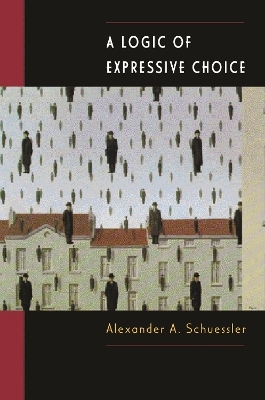
A Logic of Expressive Choice
Princeton University Press (Verlag)
978-0-691-00662-8 (ISBN)
Alexander Schuessler has done what many deemed impossible: he has wedded rational choice theory and the concerns of social theory and anthropology to explain why people vote. The "paradox of participation"--why individuals cast ballots when they have virtually no effect on electoral outcomes--has long puzzled social scientists. And it has particularly troubled rational choice theorists, who like to describe political activity in terms of incentives. Schuessler's ingenious solution is a "logic of expressive choice." He argues in incentive-based (or "economic") terms that individuals vote not because of how they believe their vote matters in the final tally but rather to express their preferences, allegiances, and thus themselves. Through a comparative history of marketing and campaigning, Schuessler generates a "jukebox model" of participation and shows that expressive choice has become a target for those eliciting mass participation and public support. Political advisers, for example, have learned to target voters' desire to express--to themselves and to others--who they are.
Candidates, using tactics such as claiming popularity, invoking lifestyle, using ambiguous campaign themes, and shielding supporters from one another can get out their vote even when it is clear that an election is already lost or won. This important work, the first of its kind, will appeal to anyone seeking to decipher voter choice and turnout, social movements, political identification, collective action, and consumer behavior, including scholars, graduate students, and upper-level undergraduates in political science, economics, sociology, anthropology, and marketing. It will contribute greatly to our understanding and prediction of democratic participation patterns and their consequences.
Alexander A. Schuessler is Assistant Professor in the Department of Politics at New York University and Director of the NYU Politics Data Center.
Preface ix Chapter One Expressive Choice and Mass Participation 3 1.1 Approaching Noninstrumental Choice 5 1.2 Methodological, But Not Ontological, Individualism 6 1.3 Overview 8 Part One: Theory 11 Chapter Two A Jukebox Model of Participation 13 2.1 Claiming Popularity 16 2.2 Horizontal Shielding of Fellow Participants 18 2.3 Horizontal Shielding of Competing Producers 21 2.4 Imposing a Cost of Participation 23 2.5 Idiom versus Motivation 26 2.6 Conclusion 27 Chapter Three Theoretical Frame 1: Choice and Doing 29 3.1 Turnout 31 3.2 Choice 36 3.3 Responses to the Participation Paradox 40 3.4 Preliminary Conclusion 47 Chapter Four Theoretical Frame 2: Choice and Being 49 4.1 Expressive Motivation and Symbolic Utility 50 4.2 Operationalizing Expressive Choice 59 4.3 Conclusion 62 Part Two: Analysis 65 Chapter Five Soft Drinks and Presidents: The Rise of Expressive Campaigns 67 5.1 Marketing and Campaigning 68 5.2 Three Phases of Mass Appeals: Soft Drinks 74 5.3 Three Phases of Mass Appeals: Presidents 79 5.4 Shielding: The "Lemons" Problem 84 5.5 Conclusion 87 Chapter Six Expressive Utility and Momentum 91 6.1 The Model 92 6.2 Heterogeneous Preferences and Turnout 105 6.3 Discussion: Momentum 112 6.4 Conclusion 117 Chapter Seven Instrumental Enhancement and Its Expressive Costs 119 7.1 Producer Interest and Producer Cost 121 7.2 Raising Benefit 124 7.3 Lowering Cost 126 7.4 Analytical Effects 128 7.5 Turnout and Negative Campaigning 130 7.6 Supply Constraints 131 7.7 Expressive Costs of Instrumental Enhancement 133 7.8 Commodification 137 7.9 Conclusion 139 Chapter Eight Expressive Momentum Strategies 141 8.1 Strategic Distortion of Participation Levels 142 8.2 "Visible" Participation 143 8.3 Expressive Essence 144 8.4 Comparative Statics 145 8.5 Nonequilibrium Optima and Groucho Equilibria 146 8.6 The Cost of Inducing Marginal Participation 147 8.7 Distortion Targets and Controlling Momentum 148 8.8 Cost Constraints 150 8.9 Profit Maximization versus Participant Maximization 152 8.10 Composition of Utility 153 8.11 Conclusion 156 Conclusion 159 References 163 Index 171
| Erscheint lt. Verlag | 29.10.2000 |
|---|---|
| Zusatzinfo | 17 line illus. |
| Verlagsort | New Jersey |
| Sprache | englisch |
| Maße | 152 x 235 mm |
| Gewicht | 312 g |
| Themenwelt | Sozialwissenschaften ► Ethnologie |
| Sozialwissenschaften ► Politik / Verwaltung ► Politische Theorie | |
| Sozialwissenschaften ► Politik / Verwaltung ► Staat / Verwaltung | |
| Sozialwissenschaften ► Soziologie | |
| ISBN-10 | 0-691-00662-8 / 0691006628 |
| ISBN-13 | 978-0-691-00662-8 / 9780691006628 |
| Zustand | Neuware |
| Haben Sie eine Frage zum Produkt? |
aus dem Bereich


